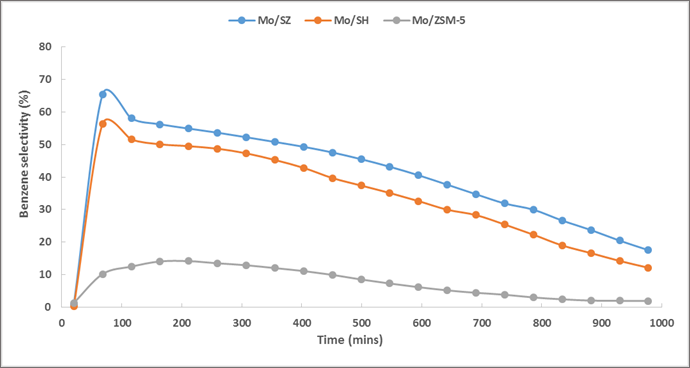

Mo doped novel solid acid catalysts:
A comparative study for methane aromatization
Abedin1, Swarom Kanitkar1,2, Srikar Bhattar1,
James J. Spivey1* text-align:center;line-height:normal"> 1Cain
Department of Chemical Engineering, Louisiana State University, Baton Rouge,
LA, USA text-align:center;line-height:normal">2National Energy Technology Laboratory, U.S. Dept. of
Energy, Morgantown, WV 26507 text-align:center;line-height:normal">*jjspivey@lsu.edu
(corresponding author)
The production of natural gas in
the United States is now at its peak, due to novel technologies such as
horizontal drilling and hydraulic fracking. The primary end uses of natural gas
include power generation and flaring. Methane is the most abundant constituent
of natural gas, and has the potential to produce high value chemicals. This
includes valuable products such as benzene, which is currently obtained by
crude oil processing through catalytic reforming. Typical methane conversion
processes consist of indirect reactions that include co-reactants, which makes
these processes less energy efficient. Direct conversion of methane does not
involve an intermediate step.
One such direct pathways to
activate methane is methane aromatization (MDHA), which converts methane
directly to benzene and hydrogen.
6CH4 = 4C6H6
+ 9H2; (ΔG298K = +433 kJ/mol, ΔH298K
= +530 kJ/mol) … (1)
Very high temperatures (7000C-10000C)
are needed to drive the equilibrium towards the formation of benzene and
hydrogen. But at these high temperatures, thermodynamics are selective towards
formation of coke. This makes MDHA as one of the most challenging problems in C1
catalytic chemistry. Mo oxide supported on ZSM-5/MCM-22 has been well-studied
in recent years for MDHA. It is generally thought that Mo carbides are
responsible for activating methane by forming CHx species, which are
dimerized into C2Hy species and then oligomerized on the
acidic zeolite sites on ZSM-5/MCM-22, leading to aromatics.
Although homogeneous acid
catalyzed-reactions are typically active and selective, the separation of the
products from the catalysts is expensive. Solid acids avoid the separation
step, and can be used at an elevated temperature. In this work, we have tested
different solid acids as supports for Mo oxide to compare the activity for
methane conversion with in-house prepared ZSM-5 (Si:Al=50:1). Here, sulfated
zirconia (SZ) and sulfated hafnia (SH) are prepared as novel acid supports for
Mo oxide. After loading Mo, these catalysts were characterized using Raman,
pyridine DRIFTS and ammonia TPD before MDHA reactions were run.
Three catalysts were tested:
Mo/SZ, Mo/SH, and Mo/ZSM-5. All the three catalysts showed comparable
catalytic activity for MDHA runs at 6500C. Mo/SZ showed higher
selectivity to benzene (Figure 1), which was comparable to that of Mo/SH. In
comparison to these two solid acids, Mo/ZSM-5 was not highly selective towards
benzene at 6500C. This may be due to a higher number of stable acid
sites for SZ and SH based Mo catalysts in comparison to that of ZSM-5 (Table 1).
Deactivation was observed for all the three catalysts with time. This can be
primarily attributed to carbon formation at catalytic surfaces, which was later
confirmed with subsequent TPO analysis.
Table 1: Ammonia-TPD results for
the three catalysts
|
Catalyst |
Total micromoles of NH3 desorbed/ consumed per gram catalyst |
|
Mo/SZ |
1560.0 |
|
Mo/SH |
1280.7 |
|
Mo/ZSM-5 |
1143.4 |
Figure 1: Benzene selectivity for
methane aromatization for Mo doped different solid acid catalysts. (6500C,
10 SCCM methane, 1 atm, 500 mg)
Preview Presentation
Presenter(s)
Language
Pricing
Individuals
| AIChE Member Credits | 0.5 |
| AIChE Pro Members | $19.00 |
| Fuels and Petrochemicals Division Members | Free |
| AIChE Graduate Student Members | Free |
| AIChE Undergraduate Student Members | Free |
| AIChE Explorer Members | $29.00 |
| Non-Members | $29.00 |

